
September 3
1777 The Stars and Stripes flies
The American flag is flown in battle for the first time, during a Revolutionary War skirmish at Cooch's Bridge, Maryland. Patriot General William Maxwell ordered the stars and strips banner raised as a detachment of his infantry and cavalry met an advance guard of British and Hessian troops. The rebels were defeated and forced to retreat to General George Washington's main force near Brandywine Creek in Pennsylvania.
Three months before, on June 14, the Continental Congress adopted a resolution stating that "the flag of the United States be thirteen alternate stripes red and white" and that "the Union be thirteen stars, white in a blue field, representing a new Constellation." The national flag, which became known as the "Stars and Stripes," was based on the "Grand Union" flag, a banner carried by the Continental Army in 1776 that also consisted of 13 red and white stripes. According to legend, Philadelphia seamstress Betsy Ross designed the new canton for the Stars and Stripes, which consisted of a circle of 13 stars and a blue background, at the request of General George Washington. Historians have been unable to conclusively prove or disprove this legend.
With the entrance of new states into the United States after independence, new stripes and stars were added to represent new additions to the Union. In 1818, however, Congress enacted a law stipulating that the 13 original stripes be restored and that only stars be added to represent new states.
On June 14, 1877, the first Flag Day observance was held on the 100th anniversary of the adoption of the Stars and Stripes. As instructed by Congress, the U.S. flag was flown from all public buildings across the country. In the years after the first Flag Day, several states continued to observe the anniversary, and in 1949 Congress officially designated June 14 as Flag Day, a national day of observance.(History.com)
1783 Treaty of Paris signed:
The American Revolution officially comes to an end when representatives of the United States, Great Britain, Spain and France sign the Treaty of Paris on this day in 1783. The signing signified America's status as a free nation, as Britain formally recognized the independence of its 13 former American colonies, and the boundaries of the new republic were agreed upon: Florida north to the Great Lakes and the Atlantic coast west to the Mississippi River. [For further details, Click here.]
1875 Birth: Ferdinand Porsche: Austro-Hungarian automotive engineer:
He is best known for creating the first hybrid vehicle (gasoline-electric), the Volkswagen, the Mercedes-Benz SS/SSK, as well as the first of many Porsche automobiles, and for his contributions to advanced German tank designs: Tiger I, Tiger II, and the Elefant. In 1937 Porsche was awarded the German National Prize for Art and Science, one of the rarest decorations in Nazi Germany.
1888 Birth: Blunck, Hans Friedrich: German writer, whose novels, plays, poetry, and fairy tales articulated a folk-nationalist ideology.
Blunck himself became a high-ranking cultural official during the Nazi period. However, most of his major works such as the novel Heinz Hoyer (1922) were produced before the National Socialists came to power. A prolific author, he produced numerous volumes of fairy tales . . . .
Most of his tales emanate from a North German folk tradition, and they tend to celebrate regional customs and rituals written in a charming and nostalgic style. In some tales there are clear racial overtones and a tendency to embellish a patriarchal world order.
1897 Antisemitism: The French periodical—Le Temps—publishes an article claiming that a certain Dr. Mandelstein, Professor at the University of Kiev, in the course of his speech opening the Zionist International Congress said this:
The Jews will use all their influence and power to prevent the rise and prosperity of all other nations and are resolved to adhere to their historic destiny i.e. to the conquest of world power.
Anti-Semites take these words very seriously and quickly use them to stir up anti-Jewish sentiments throughout eastern and Western Europe. (THP)
1914 World War I: Various:
The Abandonment of Paris by the French Government:
PEOPLE OF FRANCE!
For several weeks relentless battles have engaged our heroic troops and the army of the enemy. The valour of our soldiers has won for them, at several points, marked advantages; but in the north the pressure of the German forces has compelled us to fall back. This situation has compelled the President of the Republic and the Government to take a painful decision. In order to watch over the national welfare, it is the duty of the public powers to remove themselves, temporarily from the city of Paris. Under the command of an eminent Chief, a French Army, full of courage and zeal, will defend the capital and its patriotic population against the invader. But the war must be carried on at the same time on the rest of its territory. Without peace or truce, without cessation or faltering, the struggle for the honour of the nation and the reparation of violated rights must continue. None of our armies is impaired. If some of them have sustained very considerable losses, the gaps have immediately been filled tip from the reserves, and the appeal for recruits assures us of new reserves in men and energy tomorrow. Endure and fight! Such must be the motto of the Allied British, Russian, Belgian, and French armies. Endure and fight, while at sea the British aid us, cutting the communication of our enemy with the world. Endure and fight, while the Russians continue to advance to strike the decisive blow at the heart of the German Empire. It is the duty of the Government of the Republic to direct this stubborn resistance. Everywhere Frenchmen will rise for their independence; but, to insure the utmost spirit and efficacy in the formidable fight, it is indispensable that the Government shall remain free to act. At the request of the military authorities, the Government is therefore temporarily transferring its headquarters to a place where it can remain in constant touch with the whole of the country. It requests members of Parliament not to remain away from it, in order that they may form, with their colleagues, a bond of national unity. The Government leaves Paris only after having assured the defence of the city and of the entrenched camp by every means in its power. It knows that it does not need to recommend to the admirable population of Paris that calm, resolution, and coolness which it is showing every day, and which is on a level with its highest traditions. People of France, let us all be worthy of these tragic circumstances . . . . We shall gain the final victory; we shall gain it by unflagging will, endurance, and tenacity. A nation which refuses to perish, and which, in order to live, does not flinch either from suffering or sacrifice, is sure of victory.

List Regiment (Sep 1-Oct 7): Hitler's regiment begins a short but intensive basic training program, which is held in the premises of a large public school on the Elizabeth Platz in Munich. Hitler receives the first uniform of his life; basic greenish-grey with an "RIR 16" sown in red unto the epaulettes and a red stripe down the side of the trousers. The trousers are tucked into new leather boots, topped by a thick leather belt around the waist of the uniform jacket. [For further details, Click here.]
Captain Leefe Robinson becomes the first pilot to shoot down a Zeppelin over England, earning himself a VC:
Leefe-Robinson's VC was awarded within three days of his success in being the first to shoot down--as a member of the RFC No. 39 Home Defence Squadron--a German airship (a Schutte-Lanz) over England, a feat he achieved on the night of 2 September 1916 above Hertfordshire (some two hours after having taken off from Suttons Farm in Essex with fellow airmen).
Although a further four such airships were also brought down later that year, Leefe-Robinson's initial success was greeted with jubilation by press and public alike, the first demonstration that German airships were not in fact invincible. Relieved local residents termed Leefe-Robinson's success "Zeppelin Sunday".
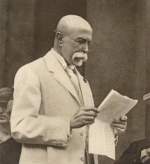
Masaryk
Czechoslovakia: US Secretary of State Robert Lansing's official statement formally recognizing Tomas Masaryk as the prospective head of a post-war Czech state:
The Czecho-Slovak peoples having taken up arms against the German and Austro-Hungarian empires, and having placed in the field organized armies, which are waging war against those empires under officers of their own nationality and in accordance with the rules and practices of civilized nations, and Czecho-Slovaks having in the prosecution of their independence in the present war confided the supreme political authority to the Czecho-Slovak National Council, the Government of the United States recognizes that a state of belligerency exists between the Czecho-Slovaks thus organized and the German and Austro-Hungarian empires. It also recognizes the Czecho-Slovak National Council as a de facto belligerent government, clothed with proper authority to direct the military and political affairs of the Czecho-Slovaks. The Government of the United States further declares that it is prepared to enter formally into relations with the de facto government thus recognized for the purpose of prosecuting the war against the common enemy, the empires of Germany and Austria-Hungary.
Hindenburg Line: The Allies force the rest of the German armies back across the Hindenburg Line, which they had crossed in March.
Pope Benedict XV named to papacy
On September 3, 1914, barely a month after the outbreak of World War I, Giacomo della Chiesa is elected to the papacy of the Roman Catholic Church, becoming Pope Benedict XV.
An aristocratic native of Genoa, Italy, who had served as a cardinal since the previous May, Benedict succeeded Pius X, who died on August 20, 1914. He was elected by a constituency made up of cardinals from countries on both sides of the battle lines, because he professed strict neutrality in the conflict. Calling the Great War "the suicide of Europe," Benedict became an insistent voice for peace from the beginning of his reign, though his calls were roundly ignored by the belligerent powers. [For further details, Click here]

1915 World War I: List Regiment: Gefreiter Adolf Hitler's 16 Reserve Infantry Regiment continue to occupy a position at Fromelles—pictured above in a drawing by Hitler—on a level field with water channels, willow trees and willow stalks; in the distance towards the enemy lines lies an insignificant wood with barbed wire entanglements. Under the direction of their defense-minded commander, Lieutenant General Gustav Scanzoni von Lichtenfels, the regiment works ceaselessly day and night to further fortify their position at Fromelles while fighting off repeated assaults by the enemy. [For further details, Click here.]
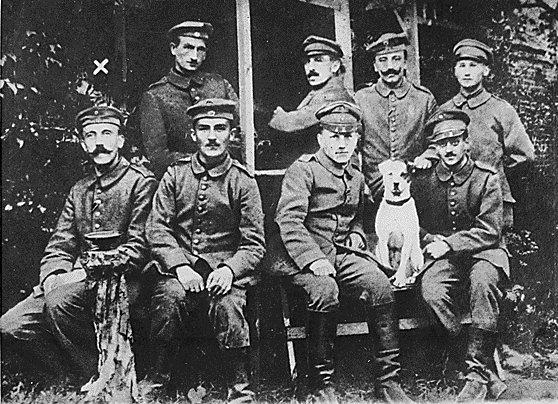
1916 World War I: List Regiment: Gefreiter Adolf Hitler endures trench warfare in Flanders (Artois) with 3 Company, 16 Reserve Infantry Regiment]. [For further details, Click here.]
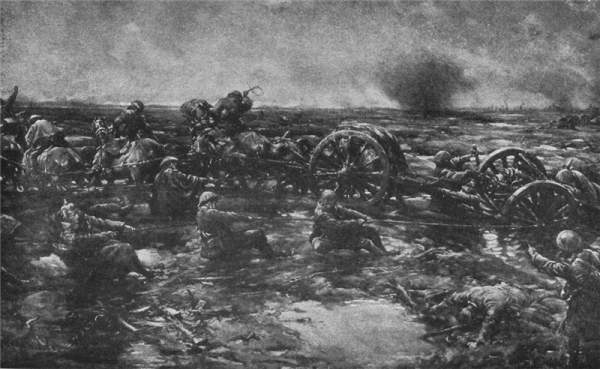
1917 World War I (July 22-September 8): Dispatch Runner Gefreiter Adolf Hitler serves at the front with 3 Company, 16 Bavarian Reserve Infantry Regiment during Phase 2 operations in Flanders. Most of their time in the trenches gas masks are worn, while English bombers attack from the air, and tanks attempt to advance over a long front through seas of mud. [For further details, Click here.]
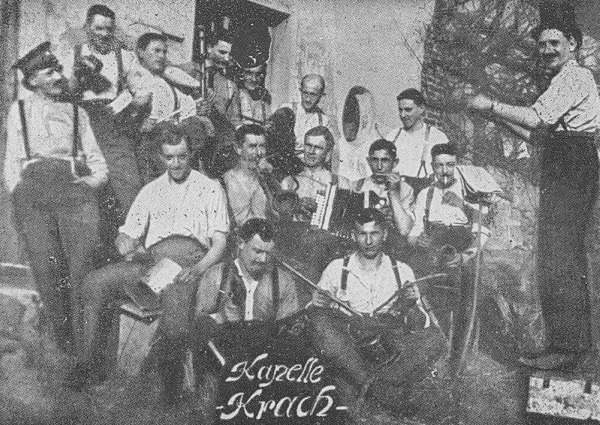
1918 World War I: List Regiment (August 21-September 27): Gefreiter Adolf Hitler attends a signals training course in Nuremberg. [For further details, Click here.]
1919 Wilson embarks on tour to promote League of Nations
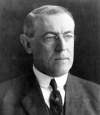
On this day in 1919, President Woodrow Wilson embarks on a tour across the United States to promote American membership in the League of Nations, an international body that he hoped would help to solve international conflicts and prevent another bloody world war like the one from which the country had just emerged—World War I. The tour took an enormous toll on Wilson's health. [For further details, Click here]
1925 The US dirigible Shenandoah—the first airship to use helium gas—runs into a storm over southern Ohio and breaks up in the air with the loss of 14 officers and men.
As the ship's broken bow passed over farmland near the small Ohio town of Sharon, the men in it yelled down to a farmer, Ernest Nichols, to grab the trail ropes. There were two attached to the nose. Nichols caught one of them and snubbed it around two tree stumps. When the crewmen jumped out of the nose to safety, they asked the farmer to fetch a rifle so they could puncture the bow's helium gas cells to bring down the remainder of the section.

1929 Wall Street: The Dow Jones industrial average closes on this day at the peak of the bull market of the 1920's: 381.17.
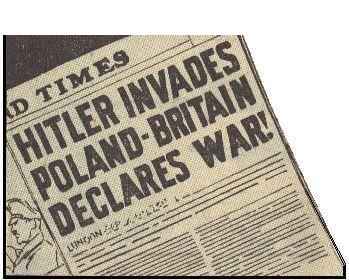
1939 Outbreak of War:
The War in Europe officially begins, as Great Britain, France, Australia and New Zealand declare war on Germany. The British ultimatum that Germany withdraw from Poland is delivered to the German Foreign Ministry at 9 AM by Ambassador Neville Henderson. It gives Hitler two hours to begin the withdrawal or a state of war will exists between the two nations. At 11 AM the French ultimatum is delivered. It expires at 5 PM.
Excerpt from memorandum handed to Sir N. Henderson at 11:20 AM by Herr von Ribbentrop:
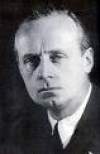
The German Government, therefore, reject the attempts to force Germany, by means of a demand having the character of an ultimatum, to recall its forces which are lined up for the defence of the Reich, and thereby to accept the old unrest and the old injustice. The threat that, failing this, they will fight Germany in the war, corresponds to the intention proclaimed for years past by numerous British politicians. The German Government and the German people have assured the English people countless times how much they desire an understanding, indeed close friendship, with them. If the British Government hitherto always refused these offers and now answer them with an open threat of war, it is not the fault of the German people and of their Government, but exclusively the fault of the British Cabinet or of those men who for years have been preaching the destruction and extermination of the German people. The German people and their Government do not, like Great Britain, intend to dominate the world, but they are determined to defend their own liberty, their independence, and above all their life. The intention, communicated to us by order of the British Government by Mr. King-Hall, of carrying the destruction of the German people even further than was done through the Versailles Treaty is taken note of by us, and we shall therefore answer any aggressive action on the part of England with the same weapons and in the same form.
Chamberlain's Broadcast on the Outbreak of War:

I am speaking to you from the Cabinet Room at 10, Downing Street. This morning the British Ambassador in Berlin handed the German Government a final Note stating that unless we heard from them by 11 o'clock that they were prepared at once to withdraw their troops from Poland a state of war would exist between us. I have to tell you now that no such undertaking has been received, and that consequently this country is at war with Germany.
You can imagine what a bitter blow it is to me that all my long struggle to win peace has failed. Yet I cannot believe that there is anything more or anything different that I could have done and that would have been more successful. Up to the very last it would have been quite possible to have arranged a peaceful and honourable settlement between Germany and Poland.
But Hitler would not have it. He had evidently made up his mind to attack Poland whatever happened; and although he now says he put forward reasonable proposals which were rejected by the Poles, that is not a true statement. The proposals were never shown to the Poles, nor to us; and though they were announced in the German broadcast on Thursday night, Hitler did not wait to hear comments on them, but ordered his troops to cross the Polish frontier next morning.
His action shows convincingly that there is no chance of expecting that this man will ever give up his practice of using force to gain his will. He can only be stopped by force and we and France are to-day, in fulfilment of our obligations, going to the aid of Poland, who is so bravely resisting this wicked and unprovoked attack upon her people.
Now may God bless you all and may He defend the right. For it is evil things that we shall be fighting against, brute force, bad faith, injustice, oppression, and persecution. And against them I am certain that the right will prevail.
Phony War: As for Britain's response, it was initially no more than the dropping of anti-Nazi propaganda leaflets--13 tons of them--over Germany . . . . They were also working under orders not to harm German civilians.
Western Front: The German military, of course, had no such restrictions. France would begin an offensive against Germany's western border two weeks later. Their effort was weakened by a narrow 90-mile window leading to the German front, enclosed by the borders of Luxembourg and Belgium-both neutral countries. The Germans mined the passage, stalling the French offensive.
The Sinking of the Athenia:
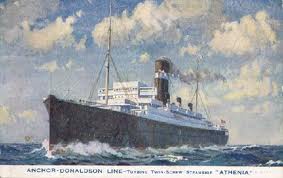
A German U-boat is accused of sinking the Athenia: a Canadian liner bound for Montreal. The sinking results in the loss of 112 lives, including 28 Americans.
At 1630 hours, U-30 was at the northern tip of its patrol zone when the bridge watch sighted a large ship looming in the distant horizon. U-30's patrol zone was at Grid AM1631, which Lemp had chosen for concealment as it was out of the normal shipping lanes. Lemp made speed on the surface to close the distance, then dived for a closer periscope inspection. By 1900 hours, the two vessels had closed. Peering through his periscope, and by now in the fading light of the summer evening, Lemp observed that she was darkened and was zigzagging at high speeds in front of the U-boat. She was large enough to be a passenger liner, but passenger liners were not supposed to be blacked out or zigzagging as if they were combatant vessels. On this basis and her unusual route through Rockall banks, Lemp concluded that she must be a British Armed Merchant Cruiser, a converted passenger liner fitted with naval guns and thus fair game under the Prize Regulations.
He sent his crew to battle stations and made ready two torpedo tubes. At 1940 hours, from a submerged position, Lemp fired the first shots of the Battle of the Atlantic. The first torpedo struck the target squarely, stopping her dead in its tracks. The second had malfunctioned and ran wild. Fearing that it might circle back and endanger the boat, he dived deep to evade and resurfaced only after the danger had passed. By that time, the sky had darkened as it was about twilight. From the bridge of U-30, Lemp observed the listing target through his binoculars. It did not appear to be in danger of sinking, so he fired a third torpedo at it. It too malfunctioned and ran wild. Exasperated at the torpedo failures, Lemp edged ever closer to finish off the kill. Taking care to keep the moon at his back, as this helped conceal the approaching U-boat, Lemp was now able to clearly make out the silhouette of the darkened ship. He checked it against the boat's copy of the Lloyd's Register and what he discovered horrified him. After all the warnings and orders issued by his Fuehrer about attacking passenger liners, he discovered his error and learnt that he had just torpedoed the SS Athenia, a 13,580 ton British passenger liner of the Donaldson line. All doubts about the identity of the ship were removed when the operator of the Athenia radioed a distress call in plain English, providing her identity, position and a three letter code SSS, meaning she was attacked by a submarine. As it turned out, the Athenia was bound for Canada with over 1,100 passengers, including women and children and 311 Americans who were fleeing the war which had just erupted in England. Lemp did not render any assistance to his victims and fearing that he might be recalled and relieved, he did not report the incident to BdU. He simply sailed away silently.
Radio address by President Roosevelt from Washington:
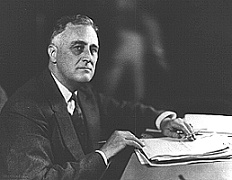
It is easy for you and me to shrug our shoulders and say that conflicts taking place thousands of miles from the continental United States, and, indeed, the whole American hemisphere, do not seriously affect the Americas-and that all the United States has to do is to ignore them and go about our own business. Passionately though we may desire detachment, we are forced to realize that every word that comes through the air, every ship that sails the sea, every battle that is fought does affect the American future. Let no man or woman thoughtlessly or falsely talk of America sending its armies to European fields. At this moment there is being prepared a proclamation of American neutrality. This would have been done even if there had been no neutrality statute on the books, for this proclamation is in accordance with international law and with American policy.
Lieutenant Colonel Nikolaus von Vormann: army liaison officer to Hitler, records in his notes of the day: "Even today the Fuehrer still believes that the Western powers are only going to stage a phony war, so to speak." (THP) Hitler's Proclamations to the German People and the German Army:
If the soldier is fighting at the front, no one shall profit by the war. If the soldier falls at the front no one at home shall evade his duty. As long as the German people was united it has never been conquered. It was the lack of unity in 1918 that led to collapse. Whoever offends against this unity need expect nothing else than annihilation as an enemy .
Joachim von Ribbentrop—Reich Foreign Minister—to the German Ambassador in the Soviet Union Schulenburg:

Telegram: We definitely expect to have beaten the Polish Army decisively in a few weeks. We would then keep the area that was established as German sphere of interest at Moscow under military occupation. We would naturally, however, for military reasons, also have to proceed further against such Polish military forces as are at that time located in the Polish area belonging to the Russian sphere of interest. Please discuss this at once with Molotov and see if the Soviet Union does not consider it desirable for Russian forces to move at the proper time against Polish forces in the Russian sphere of interest and, for their part, to occupy this territory. In our estimation this would be not only a relief for us, but also, in the sense of the Moscow agreements, in the Soviet interest as well. In this connection please determine whether we may discuss this matter with the officers who have just arrived here and what the Soviet Government intends their position to be.
Winston Churchill speaks to the House of Commons:

We must not underrate the gravity of the task which lies before us or the temerity of the ordeal, to which we shall not be found unequal. We must expect many disappointments, and many unpleasant surprises, but we may be sure that the task which we have freely accepted is one not beyond the compass and the strength of the British Empire and the French Republic. The Prime Minister said it was a sad day, and that is indeed true, but at the present time there is another note which may be present, and that is a feeling of thankfulness that, if these great trials were to come upon our Island, there is a generation of Britons here now ready to prove itself not unworthy of the days of yore and not unworthy of those great men, the fathers of our land, who laid the foundations of our laws and shaped the greatness of our country.
Aktion Tannenberg:
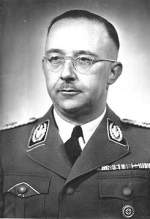
Himmler tells the Einsatzgruppe under Udo von Woyrsch that its mission is to suppress the Polish resistance movement with all available means. The overall operation of the Einsatzgruppen in Poland has been given the code-name Aktion Tannenberg. It will officially come to an end on October 25. (THP) Note: It is uncertain whether this code-name referred to the Battle of Tannenberg (1914) or to the well-known Pan-German writer Otto Richard Tannenberg. (See Tannenberg, 1911)

Unity Mitford—British citizen and Hitler admirer—shoots herself in the head with a small pistol outside a German government building in Munich. Her attempt is unsuccessful and she will continue to live for several years after the war as an invalid.
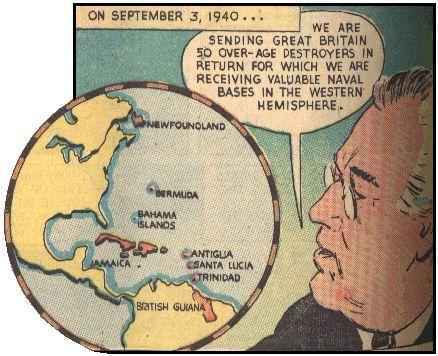
President Roosevelt addresses Congress:
The right to bases in Newfoundland and Bermuda are gifts, generously given and gladly received. The other bases mentioned have been acquired in exchange for 50 of our over-age destroyers. This is not inconsistent in any sense with our status of peace. Still less is it a threat against any nation. It is an epochal and far-reaching act of preparation for continental defense in the face of grave danger. Preparation for defense is an inalienable prerogative of a sovereign state. Under present circumstances this exercise of sovereign right is essential to the maintenance of our peace and safety. [For the full text, Click here.]
1940 World War II: Various:
Operation Sealion: The operational orders for the invasion of Britain, are issued. S-Day is scheduled for September 21.
[See: What Were Adolf Hitler's Major Blunders?]Romania: The Legionary Revolution breaks out at 9 AM. Fighting in Bucharest, Brasov, and Constanta results in the death of nine Legionaries. Most public buildings are quickly occupied and the Palace is surrounded. General Coroama, Commander of the Bucharest Army Corps, refuses to order his troops to fire on the Legionaries. (THP)
1941 Various:
Countdown to Infamy: The US State Department tells the Japanese that the meeting they have requested between Roosevelt and Prince Konoye cannot take place. Supposedly the Americans are concerned that Konoye, Japan's prime minister, might not be able to convince the Japanese military to keep to any agreement that might be made.
Holocaust: Various:
Six hundred Soviet POW's and 300 Jews are gassed at Auschwitz in an experiment using Zyklon B—hydrocyanic acid—a commercial pesticide. From the testimony of Rudolf Hoess, Auschwitz commandant:
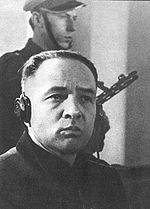
The 'final solution' of the Jewish question meant the complete extermination of all Jews in Europe. I was ordered to establish extermination facilities at Auschwitz in June 1941. At that time, there were already in the General Government three other extermination camps: Belzek, Treblinka, and Wolzek. These camps were under the Einsatzkommando of the Security Police and SD. I visited Treblinka to find out how they carried out their exterminations. The camp commandant at Treblinka told me that he had liquidated 80,000 in the course of one-half year. He was principally concerned with liquidating all the Jews from the Warsaw Ghetto. He used monoxide gas, and I did not think that his methods were very efficient. So when I set up the extermination building at Auschwitz, I used Cyklon B, which was a crystallized prussic acid which we dropped into the death chamber from a small opening. It took from 3 to 15 minutes to kill the people in the death chamber, depending upon climatic conditions. We knew when the people were dead because their screaming stopped. We usually waited about one-half hour before we opened the doors and removed the bodies. After the bodies were removed our special Kommandos took off the rings and extracted the gold from the teeth of the corpses.
From a Memorandum by Secretary of State Hull on US-Japanese Negotiations:
At the request of the President, the Japanese Ambassador called at the White House this afternoon...The Ambassador then proceeded to say that he had a despatch from Tokyo referring to the fact that certain elements of opposition to the proposals of the Prime Minister existed and were active in their opposition. He said that the Government, however, is determined to overcome such opposition. He stated that a meeting between the President and the Prime Minister would enable Japan to overcome these disagreements at home and that the opposition would gradually get in line.
From the Duty Book of Captain Shigeshi Uchida:
A liaison conference between the Government and the High Command was held in which it was reported a decision was reached so as to exert preperations with a determination of not avoiding war. A part of the Army's mobilization is expected to be started from the middle of this month. (Dillon)
[See: Countdown to Infamy: Timeline to Pearl Harbor.]
Estonia is easily conquered by the Germans. Following the occupation of Tallinn, the remaining 1,000 Jews are murdered by SS killing squads. (THP)

1942 World War II: Stalingrad: Round-the-clock air attacks by Luftflotte 4. Units under von Paulus penetrate the inner city after having joined up with forward elements advancing from the south. To the south of Stalingrad, after pitched seven-day long battle, forces of the Hoth's 4th tank division managed to take Abganerovo and Tinguta, although at a great cost. They also captured station "55th km" and forced back the left flank of the 64th army to the height 174,0, Zety, Kashary (15 km to north-west of Abganerovo). Spearhead forces of the division took settlement Tundutovo, south-east to Abganerovo. On September 2nd , 62nd and 64th soviet armies were forced to retreat to the main line of Stalingrad defense, while Wehrmacht commenced full-scaled assault on the city. 14th division, after being replaced by Romanian forces and reinforced with tank battalion of the 29th mechanized division and light mine throwers, prepared to attack.
1943 World War II: Various:
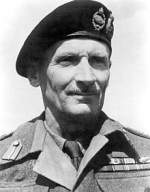
Allies invade Italian mainland:
The British 8th Army under Field Marshal Bernard L. Montgomery begins the Allied invasion of the Italian peninsula, crossing the Strait of Messina from Sicily and landing at Calabria--the "toe" of Italy. On the day of the landing, the Italian government secretly agreed to the Allies' terms for surrender, but no public announcement was made until September 8.
Italian dictator Benito Mussolini envisioned building Fascist Italy into a new Roman Empire, but a string of military defeats in World War II effectively made his regime a puppet of its stronger Axis partner, Germany. By the spring of 1943, opposition groups in Italy were uniting to overthrow Mussolini and make peace with the Allies, but a strong German military presence in Italy threatened to resist any such action.
On July 10, 1943, the Allies began their invasion of Axis-controlled Europe with landings on the island of Sicily, off mainland Italy. Encountering little resistance from demoralized Sicilian troops, Montgomery's 8th Army came ashore on the southeast part of the island, while the U.S. 7th Army, under General George S. Patton, landed on Sicily's south coast. Within three days, 150,000 Allied troops were ashore. On August 17, Patton arrived in Messina before Montgomery, completing the Allied conquest of Sicily and winning the so-called Race to Messina.
In Rome, the Allied conquest of Sicily, a region of the kingdom of Italy since 1860, led to the collapse of Mussolini's government. Early in the morning of July 25, he was forced to resign by the Fascist Grand Council and was arrested later that day. On July 26, Marshal Pietro Badoglio assumed control of the Italian government. The new government promptly entered into secret negotiations with the Allies, despite the presence of numerous German troops in Italy.
On September 3, Montgomery's 8th Army began its invasion of the Italian mainland and the Italian government agreed to surrender to the Allies. By the terms of the agreement, the Italians would be treated with leniency if they aided the Allies in expelling the Germans from Italy. Later that month, Mussolini was rescued from a prison in the Abruzzo Mountains by German commandos and was installed as leader of a Nazi puppet state in northern Italy.
In October, the Badoglio government declared war on Germany, but the Allied advance up through Italy proved to be a slow and costly affair. Rome fell in June 1944, at which point a stalemate ensued as British and American forces threw most of their resources into the Normandy invasion. In April 1945, a new major offensive began, and on April 28 Mussolini was captured by Italian partisans and summarily executed. German forces in Italy surrendered on May 1, and six days later all of Germany surrendered. (History.Com)
From a document issued by the Fuehrer's headquarters:
1) The Commander-in-Chief, Air General Staff, is planning the erection of further camps for air force prisoners, as the number of new prisoners is mounting to more than 1,000 a month, and the space available at the moment is insufficient. The Supreme Commander of the Luftwaffe proposes to establish these camps within residential quarters of cities, which would constitute at the same time a protection for the Populations of the town and, in addition, to transfer all the existing camps, containing about 8,000 British and American Air Force prisoners, to larger towns threatened by enemy air attack . . . .
2) The Supreme Commander of the Wehrmacht, Chief of War Prisoners, has approved this project in principle.
Badoglio regime: In Algiers, the Badoglio regime of Italy secretly signs an armistice with the Anglo-American forces, but the Italian capitulation will not be announced until September 8.
1944 World War II:
France: US forces advancing from the south capture Lyon.
Belgium: British troops occupy Brussels.
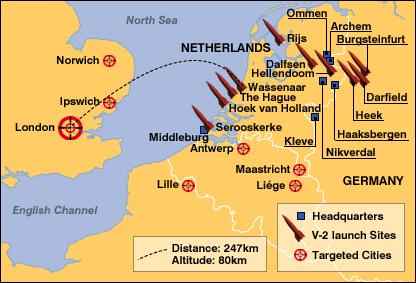
1945 War in the Pacific: Japanese forces in the Philippines surrender to the Allies.

1948 Death: Edvard Benes: leader of the Czechoslovak independence movement and the second President of Czechoslovakia. He served as President of Czechoslovakia from 1935 to 1938 and again from 1945 to 1948, his term broken by World War II, during which he served as president-in-exile from 1940 to 1945. During World War I he was one of the leading organizers of an independent Czechoslovakia abroad.
1943 Spandau Prison: From Spandau: The Secret Diaries, by Albert Speer:
Raeder has returned from his wife's visit. He told her that he gained six pounds during the American month. When she asked how much he had lost during the Russian month, the Soviet interpreter interrupted, "Stop! you're not allowed to say that." Neurath, during his wife's visit, reported that he was feeling well. That time, too, the Russian interpreter interrupted, but Neurath went on undeterred. "As you see, everything is lies and hypocrisy here." (Speer II)
Edited by Levi Bookin (Copy editor)
levi.bookin@gmail.com



Click to join 3rdReichStudies



Disclaimer: This site includes diverse and controversial materials--such as excerpts from the writings of racists and anti-Semites--so that its readers can learn the nature and extent of hate and anti-Semitic discourse. It is our sincere belief that only the informed citizen can prevail over the ignorance of Racialist "thought." Far from approving these writings, this site condemns racism in all of its forms and manifestations.
Fair Use Notice: This site may contain copyrighted material the use of which has not always been specifically authorized by the copyright owner. We are making such material available in our efforts to advance understanding of historical, political, human rights, economic, democracy, scientific, environmental, and social justice issues, etc. We believe this constitutes a "fair use" of any such copyrighted material as provided for in section 107 of the US Copyright Law. In accordance with Title 17 U.S.C. Section 107, the material on this site is distributed without profit to those who have expressed a prior interest in receiving the included information for research and educational purposes. If you wish to use copyrighted material from this site for purposes of your own that go beyond 'fair use', you must obtain permission from the copyright owner.
Please Note: The list-owner and moderators of 3rdReichStudies are not responsible for, and do not necessarily approve of, the random ads placed on our pages by our web server. They are, unfortunately, the price one pays for a 'free' website.